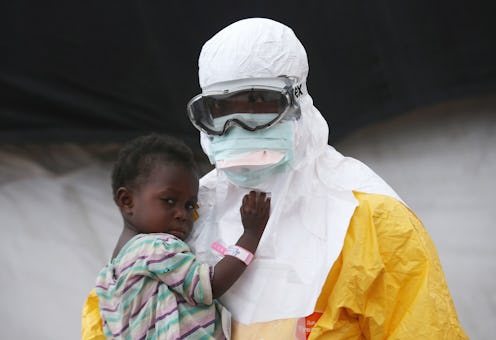News
Ebola Could Be Under Control By The Spring
The head of the global Red Cross, Secretary General Elhadj As Sy, said Wednesday the latest outbreak of the Ebola virus could be contained in four to six months if health officials and governments follow proper quarantine and safe burial procedures. The virus has already killed upward of 4,500 people — the vast majority of them in West Africa — since breaking out earlier this year.
Speaking to reporters in Beijing, Sy criticized governmental responses that put enforcing travel bans above providing personnel and resources to fight the virus on the ground. With “good isolation; good treatment of the [confirmed] cases; good, dignified and safe burials,” he claimed that the virus could be controlled, much like past outbreaks, within months. Sy joins World Bank President Jim Yong Kim in expressing criticism of proposed travel bans.
Sy’s comments come on the same day that the United States' Centers for Disease Control announced new screening and travel procedures for all travelers arriving from Guinea, Sierra Leone, and Liberia. Now all passengers who have been in any of the three impacted countries within the last 21 days are required to enter the U.S. through five portal airports where they will be subject to intensified screening for the deadly virus.
And starting Monday, the CDC is rolling out a new check-in program for individuals coming from impacted areas. For 21 days after arriving in the U.S., travelers will have to call in to health officials once a day to report their temperature and screen for the onset of troubling symptoms.
Some Congressional lawmakers are pushing for an even more restrictive move — banning travel from the afflicted portions of West Africa entirely. President Barack Obama has said that he is open to a travel ban, if recommended by the country’s health experts.
The debate over how to contain the deadliest outbreak of the bleeding fever continues to rage between those who push to isolate Ebola-ridden communities and those looking to control and contain the virus by treating at the source. For Sy, the global community must be strategic in its efforts to tamp down Ebola's reach.
[Ebola] creates a lot of fear and extreme panic that sometimes lead to very irrational type of behaviors and measures, like closing borders, canceling flights, isolating countries, etc. Those are not solutions. The only solution is how can we join our efforts to contain those kinds of viruses and epidemics at their epicenter, right where they start.
Using Sy's rubric, it looks like a quite unexpected nation is making passing marks: Cuba will deploy 250 medical personnel to West Africa to help tamp down the outbreak. For such a small country, U.S. State Department spokesperson Marie Harf noted, sending this number of health workers is quite a significant contribution.
Yet the threat of travel bans still looms large. The World Health Organization’s Emergency Committee on Ebola is meeting now to discuss the crisis response, and the Committee could announce new recommendations in the next couple of days, including the implementation of travel bans and trade restrictions.
With the virus showing no sign of slowing — there are more than 20 deaths each day in Sierra Leone alone, according to government estimates — and few resources at their disposal, the governments in West Africa are mired in a losing battle. Barring any substantial changes to how the crisis response is managed, the World Health Organization warns that we could see between 5,000 and 10,000 new cases of Ebola each week come December.
The sooner that Western governments and health organizations take a proactive approach to providing medical personnel, resources and financial help to the communities on the battlefront, the more likely Ebola can be controlled and contained. Simply trying to keep out any traveller who might be carrying the virus is neither a long-term nor winning strategy.
Images: Getty Images (2)
